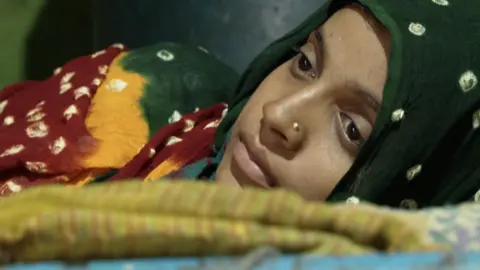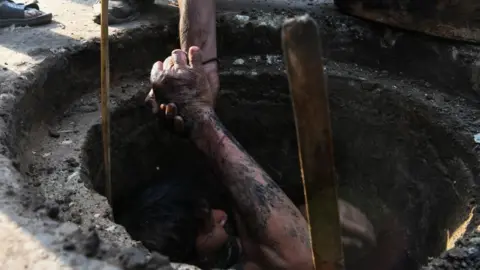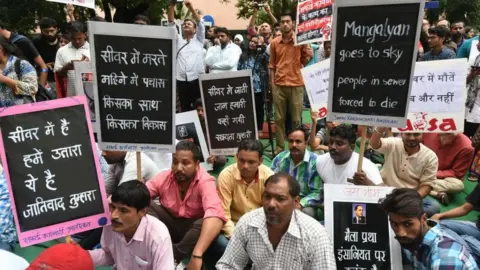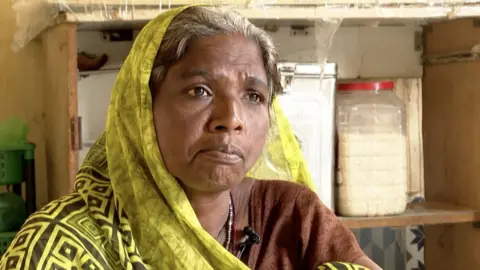Manual scavenging: The unending pain of India's sewer workers
 Pavan Jaiswal/BBC
Pavan Jaiswal/BBCIn a dimly lit hut in the western Indian state of Gujarat, Anjana cradles her baby boy, her eyes welling up as she says he is named after his father.
Anjana's husband Umesh Bamaniya died in April, 10 days before his son was born, while cleaning a choked sewer - a job that would've earned him 2,000 rupees (£19; $24). His body, enveloped in sewage, was retrieved from a manhole in Gujarat's Tharad town. He was just 23 years old.
The loss of her husband, the family's breadwinner, has left Anjana devastated. "How will I raise my children and educate them?" she asks.
Hundreds of miles away, in the southern state of Tamil Nadu, Annamma is in a similar state.
Her husband Moses, 40, died of asphyxiation inside a sewer at a factory in Chennai city in September.
Until his death, Annamma didn't even know her husband cleaned sewers. "He told us he worked at a canteen and sometimes doubled up as a daily wage worker," she said.
Annamma, who has two little girls, is still in shock. "Forget about money and survival, how will I tell my children that their father died while cleaning a septic tank?"
 Getty Images
Getty ImagesUmesh and Moses are among thousands of sanitation workers from low-caste communities who manually clean sewers, septic tanks, toilets and drains. They are widely considered manual scavengers, though experts say the legal definition of the term, which only includes people who clean or handle human waste in spaces such as "insanitary latrines" or railway tracks, is too narrow.
Manual scavenging is banned in India but the practice is still commonplace, with people forced into it because of rigid caste rules and the lack of other livelihood options. They are hired by local corporations and even private contractors to clean sewers and drains that are blocked because of mud and plastic.
Successive federal governments, including the current one, have missed several deadlines to declare India free of manual scavenging, most recently in August this year.
There is little agreement on how many people are engaged in manual scavenging - in 2021, a federal minister told parliament that the government had identified 58,098 manual scavengers in the country through surveys, but also added that there was "no report of practice of manual scavenging currently in the country". But according to the Safai Karmachari Andolan, which works to eliminate manual scavenging, there are more than 770,000 such workers.
Deaths like those of Umesh and Moses - usually through asphyxiation from inhaling toxic gases in the sewer - are often reported from different Indian cities. In July, the government said that 339 people had died in the past five years while cleaning sewers and septic tanks.
Another report by the National Commission for Safai Karamcharis (NCSK) - a government-appointed organisation that oversees the conditions of sanitation workers - says that 928 sewer workers died between 1993 and 2020, with the states of Tamil Nadu and Gujarat reporting the highest casualties. Even this could be an undercount - most of the affected workers are hired on contract, which makes it easier for authorities or the people who hired them to not claim responsibility.
"Resultantly, these deaths are never considered by the state administration while compiling the data of sewer deaths and hence they remain unreported and non-compensated," the NCSK report says.
 Getty Images
Getty ImagesBezwada Wilson, national convenor of the Safai Karmachari Andolan, alleges that the government "lacks the willingness" to count the exact number of manual scavengers.
"The government has appointed police officers to go to colonies and count the numbers of workers. But a lot of people refrain from identifying themselves as manual scavengers because of stigma, leading to undercounting," he says.
Lal Singh Arya, national president of the governing Bharatiya Janata Party's (BJP's) Scheduled Caste Front, denied this, saying the government has been making sincere efforts to eradicate the practice. (Scheduled Castes are officially designated groups of historically disadvantaged communities who form the majority of manual scavengers)
"The government has allocated a separate budget for states to acquire new technology to clean sewers and has made provisions for alternate employment for the workers," he says.
"But if the practice still persists, then strong action must be taken," Mr Arya adds.
The BBC has emailed questions to the federal ministry of social justice and empowerment about the allegations raised by activists but has not received a response yet.
Governments have put the emphasis on mechanical de-sludging and protective equipment - and Prime Minister Narendra Modi's Swachh Bharat Abhiyan (Clean Indian Campaign) brought the issue back to mainstream attention about a decade ago - but activists say a lot more needs to be done.
For instance, many contractors and corporations don't provide safety gear to workers or have the equipment for mechanised sewer cleaning. The sewers are also often designed in such a way that machines cannot be used to clean them.
 Pavan Jaiswal/BBC
Pavan Jaiswal/BBCActivists also have to fight to get compensation for family members of dead workers.
"I have come across many cases where the family members of a worker who died inside a manhole did not receive the financial compensation that was promised to them," says Purushottam Vaghela, an activist who runs a non-profit organisation called Manav Garima (Human Dignity).
Ratnaben is one of them - her husband Shambhubhai died in 2008 after inhaling toxic gases inside a sewer at a private factory in Ahmedabad city in Gujarat.
Fifteen years later, she says she hasn't received the promised help from the district administration.
"When my husband died, big promises were made to me, like money, a government job, a house and a good school for my children. But I have grown old waiting for these things," says Ratnaben, who works as a rag-picker.
The district collector of Ahmedabad did not respond to the BBC's questions about Ratnaben's allegations.
Mr Wilson says that even if workers want to leave the job, stigma and caste discrimination prevent them from doing so.
"This makes their social rehabilitation even more difficult even if they were to find alternative means of livelihood," he says.
With inputs from Prabhakar Tamilarasu in Chennai and Deepak Sharma in Delhi
BBC News India is now on YouTube. Click here to subscribe and watch our documentaries, explainers and features.

Read more India stories from the BBC:

